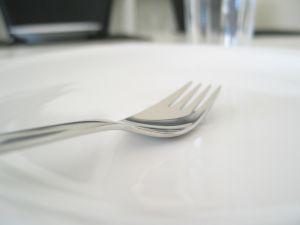
Fasting isn't a new weight loss method, but with several new books hitting the market, including The Fast Diet by Dr. Michael Mosley, intermittent fasting is becoming the hottest diet trend in 2013.
So what is The Fast Diet?
Basically it's a diet plan with a 5:2 rule. You can eat whatever you want for 5 days and then fast for two consecutive days. While some fasts don't include any food, this particular plan allows for 500 calories for women and 600 calories for men.
There is some research that suggests that intermittent fasting, along with the benefits of losing weight, can relieve obesity-related diseases and prolong your life. The down side are the side effects that include:
- Sleeplessness
- Bad breath
- Anxiousness
- Irritability
- Dehydration
- Dizziness
- Weakness
- Headaches
- Mental confusion
Not all experts agree that this is the best way to lose weight. Fasting can cause muscle loss, slow down your metabolism and put your body in a state of ketosis. Your body is put through a lot of stress. It depletes your stored carbs and then starts using your muscle and fat for energy. In any case, it is not intended for long-term use.
Furthermore, fasting for two days can cause feelings of deprivation which lead to overeating on the other days. It can encourage binge eating and other food disorders. This type of diet doesn't factor in the importance of micro and macronutrients, hormone imbalances or insulin spikes. Dieters don't learn the importance of healthy eating and continue to consume foods that contribute to inflammation and disease.
When weight comes off easy in the beginning, it's likely to be water weight. That kind of weight loss can't be continued over time. The weight will come back on just as easily.
Is The Fast Diet Right for Lifters?
The answer is different depending on your goals. Some lifters find great success with intermittent fasting. If you goal is to lean out, fasted workouts can be beneficial. On the other hand, if you are lifting heavy to gain strength or to gear up fro your next competition, fasting might not be the best option.
It is ideal to eat two hours before a heavy training session and eat afterward for recovery. The Fast Diet limits your calories to the point where this may be impossible.
The fasting diet also creates a lack of energy and mental strength. If you experience some of the symptoms listed above, that will also make it harder to perform at your best.
Intermittent fasting can cause more trouble than it's worth for people with health issues or unhealthy eating habits. If you choose to follow The Fast Diet be sure to track your progress and stop if you feel harmful side effects. Do what works for you and don't just follow along with the latest fad diet.

